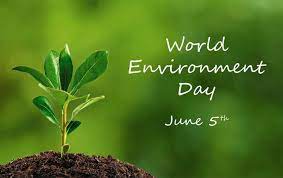World Environment Day being celebrated today
Mon 05 Jun 2023, 10:15:26

The World Environment Day is an annual global event observed on June 5. This year, it falls on Monday and also marks the 50th anniversary of World Environment Day. The day encourages awareness and action for environmental protection by the global community. Many non-governmental organisations, businesses, and government entities back the cause. Moreover, World Environment Day is the United Nations outreach day for encouraging worldwide awareness and supporting the environment.
The day is observed to raise global awareness to take positive environmental action to protect nature and the planet Earth.
It is observed on 5th June every year since 1973 as part of the United Nations Environment Programme to build awareness to save life on planet Earth.
World Environment Day is the largest global platform for environmental public outreach, and millions celebrate it across the globe. According to the official website of World Environment Day, the theme on June 5, 2023, will focus on solutions to plastic pollution under the campaign #BeatPlasticPollution. This year, Côte D'Ivoire will host.
The government of the Netherlands is supporting this year's World Environment Day. The nation is one of the countries taking ambitious action along the plastic lifecycle. It is a signatory of the New Plastics Economy Global Commitment and a member of the Global Partnership on Plastic
Pollution and Marine Litter.
Pollution and Marine Litter.
Led by the United Nations Environment Programme (UNEP), World Environment Day was first marked on June 5, 1973, during the Stockholm Conference on the Human Environment. At that time, the theme was 'Only One Earth'. World Environment Day aims to bring together millions of people from across the globe, engaging them in the effort to protect and restore the Earth.
According to the UN, "more than 400 million tonnes of plastic is produced every year worldwide, half of which is designed to be used only once. Of that, less than 10 per cent is recycled. An estimated 19-23 million tonnes end up in lakes, rivers and seas annually. Microplastics find their way into food, water and air. It is estimated that each person on the planet consumes more than 50,000 plastic particles per year –and many more if inhalation is considered."
Therefore, to keep global warming in check, we must halve annual greenhouse gas emissions by 2030. Without action, exposure to air pollution beyond safe guidelines will increase by 50 per cent within the decade, and plastic waste flowing into aquatic ecosystems will triple by 2040. the situation requires immediate action. Therefore, this year, governments, companies and other stakeholders must scale up and speed up actions to solve this crisis with available science and solutions to tackle the problem.
No Comments For This Post, Be first to write a Comment.
Most viewed from Specials
Most viewed from World
AIMIM News
Latest Urdu News
Most Viewed
May 26, 2020
Do you think Canada-India relations will improve under New PM Mark Carney?
Latest Videos View All
Like Us
Home
About Us
Advertise With Us
All Polls
Epaper Archives
Privacy Policy
Contact Us
Download Etemaad App
© 2025 Etemaad Daily News, All Rights Reserved.










































